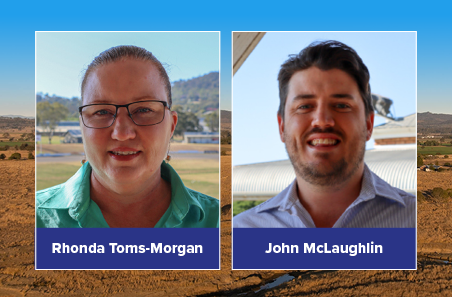
Meet the deliverers: Carbon EDGE south-west Queensland
Rhonda Toms-Morgan and John McLaughlin, who present Carbon EDGE workshops in northern Australia, are part of a growing network of workshop presenters across the country.
From the Maranoa region, Rhonda operates an agricultural extension business, supporting grazing and broadacre enterprises across south-west Queensland to maximise their business.
Based in Toowoomba, John supports graziers in setting up carbon farming projects under the Australian Government ACCU Scheme, while also working with the University of Southern Queensland to interpret climate forecasts to help inform on-farm decision-making.
Rhonda and John were a part of the working group that developed the Carbon EDGE workshop and are always keeping up to date with new research in the space.
The two will deliver their next workshops at Emerald on 11–12 February 2025 and Goondiwindi on 13–14 March 2025.
Here, we get to know both John and Rhonda, and their thoughts on MLA’s Carbon EDGE workshop.
How did you find yourself working with carbon?
John: I moved into the carbon world because I saw so much interest in the area from producers. There weren’t a lot of people around to translate the information in a way that’s understandable and practical for producers.
Rhonda: I worked as a Regional Climate Change officer for 10 years, where I helped design and deliver field days and workshops to help producers better understand the topic. Over the last five years, I have run over 130 events across southern Queensland.
There’s been a producer-driven demand for clear messaging around carbon for over 15 years, but until Carbon EDGE, there has never been a thorough enough independent offering.
Why is Carbon EDGE a valuable offering?
John: There’s an eagerness to learn the principles and fundamentals of carbon and how it works, but that should come from an impartial and educational standpoint, rather than someone trying to sell products with a financial investment.
After the workshop, there are plenty of in-depth resources for producers to take home to continue that learning and make real changes within their operation.
Rhonda: Emissions and sustainability reporting have been legislated with the phasing in of climate-related financial disclosures adopted by Federal Parliament in September, and the industry is having to play catch up. When there are so many players in the game, it’s crucial to have a clear voice to cut through what is being asked of producers and give them confidence in how they best respond.
What are the takeaways for producers attending the workshops?
John: Landholders are leaving the Carbon EDGE workshop with a list of actions, categorised into Do Now, Do Next, Do Later. The most obvious and widespread action aligns with a host of other industry initiatives – collect data and document what you do! This is vital in terms of producers understanding their position regarding carbon and monitor progress towards achieving their goals and targets in this space.
Rhonda: There’s a lot of reassurance found in learning that doing good business can generally deliver positive outcomes for carbon too. Producers are also really valuing the use of their own property data at the workshops. This means they can evaluate their own carbon accounts and sequestration options, which is a unique offering in the current landscape.
Why do you recommend people in the industry attend?
John: The most important tool they can take away is understanding the language used in the carbon space. People who have heard about carbon for 15 minutes at a field day are at risk of misinterpreting fundamental terminology and using it in a way that is not appropriate or correct, leading to mass confusion and misinformed decisions. Knowing the lingo is so important to allow people to have conversations in the space.
Rhonda: There’s a gap in terms of independent information in the industry, and Carbon EDGE has done a really good job of consolidating that for producers without forcing any decisions into offsets or any sales at all. This is the missing link for red meat producers on the topic and it’s important that producers understand what options are best for their business. We need as many producers across this topic as possible to engage meaningfully with the supply chain, consumers, suppliers and policymakers.
Find out more about to what to expect from Carbon EDGE:



